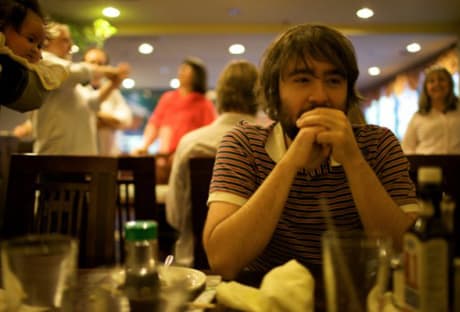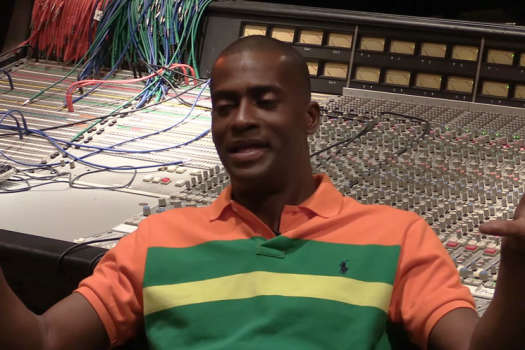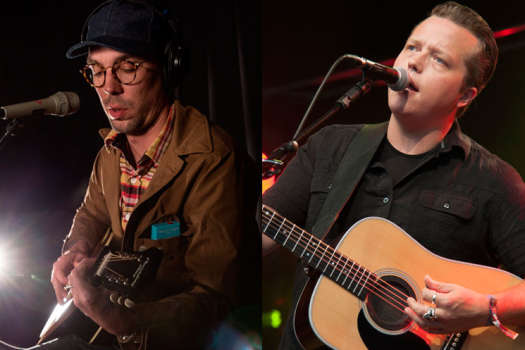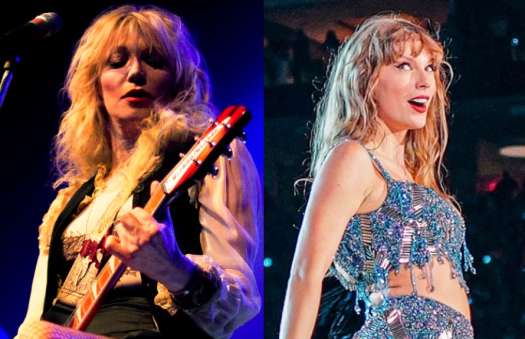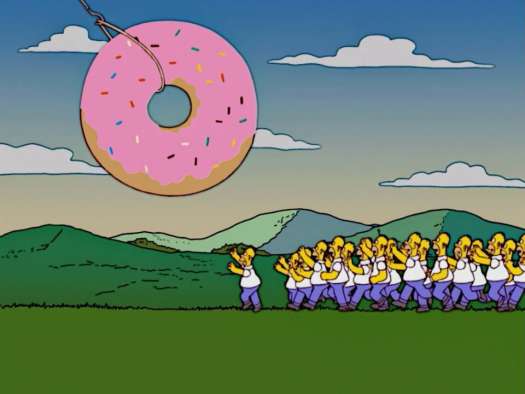A decade ago, when Dntel recorded "(This is) The Dream of Evan and Chan," his partnership with Death Cab for Cutie's Ben Gibbard may have been viewed as an oddity. Now that electronic and indie rock have become joined at the hip (with much assistance from Dntel and Gibbard's band, the Postal Service), it's easier to see the similarities between the two musicians. Aimlessness, the fourth LP from Dntel (aka Jimmy Tamborello), manages to produce that same warm, nostalgic dreamo that fuelled most of Gibbard's material. Dntel doesn't allow ambiance to define Aimlessness as much as he uses it as a starting point, building from desert landscapes and ice sheets created by knobby, dusty synthesizers.
I know you get asked this between each album, but what took you so long?
Dntel: I usually don't have a deadline set out because I usually don't know when I'm going to sit down and work on something, so it usually takes a long time to sit down and put it together. As long as I'm kind of working on music, I usually don't have strong goals about what's going to happen with it; I can usually get lost in a project. I think this is the quickest between releases, if you count the two EPs I released on Sub Pop in 2010.
The trade-off would be that you never have to feel like you're forcing music.
Well, maybe with remixes I felt like I had deadlines and then there are times where I can't deal with a song anymore so I'll force myself to do it, but, yeah, a lot of my songs take a long time. And now with Sound Clouds, I'll have instrumentals I like ― I could just put it up there and get the satisfaction from the feedback I get before I finish it totally.
Is that your preferred method now?
I find that, more than anything, I overdo it with songs ― work on them too much. But with this label, they would tell me when they thought the song was done so I could work a little faster.
Can you talk a bit about the new album?
Dumb Luck had more of an organic feel because there were more live instruments involved and there were vocals on everything. A lot of those songs were structured a little bit more towards vocals. The new album is mostly instrumental and I don't think I used any live instruments at all.
There are sonic similarities between your guest vocalists (Baths, Nite Jewel) and your music on Aimlessness. Did you choose these two to try to get away from the indie rock sound of your previous LPs?
They both kind of happened by accident; I wasn't really thinking about any particular vocalist who would do these songs the best. It was more like ― things sort of happened circumstantially. They're both singers that I like a lot. I met Will [Baths] last fall; his side-project, Geotic, went on a tour with Dntel and another band, the One AM Radio. I was playing the instrumental of the song ["Still"] he ended up singing on during that tour and about halfway through the tour he told me that he worked out some vocals and had been singing along to it a little. We started performing it live at the shows and we kind of refined it from there. But that happened really organically.
You've released this album on DJ Koze's Pampa Records. I also understand that he had a hand in the recording of the LP, which is a bit like the hip-hop model. Is that what you were striving to emulate?
I didn't need an "as involved" label boss as that; I needed someone more to help me finish the songs. It was almost more like the old fashioned A&R guys. I'm used to turning in an album when it's done and with this, I wanted a little more guidance; I wanted someone to tell me what to do so I didn't have to figure it all out on my own. I mostly needed someone to tell me when the songs were ready or else I would keep going back and working on them.
What's the longest you've ever spent on a song?
The songs on Dumb Luck, I feel, took the most time. Maybe "Dumb Luck." That one I felt like I started at the beginning of 2003 and I was working on it until the album came out [in 2007]. It doesn't mean it's a good thing; it's not like I'm working every day on it, but it's usually unhealthy.
From the beginning, your sound always had this warm, emotional feel that most electronic music didn't have at the time. How did you come up with this take on a style of music that is usually either very sterile or clubby?
I grew up on '80s new wave techno-pop stuff like Depeche Mode, Pet Shop Boys and New Order. A lot of that has an obvious human emotional side to it and also, growing up, my dad had a little home studio with a keyboard, sequencer and eight-track. I feel that making electronic music does have an emotional, nostalgic connection for me because of that.
The Postal Service sound has become such a part of the musical lexicon, from television ads to new music. Do you feel that it's grown so big that you've lost your connection to it?
I still feel connected to that album, but there's a lot of stuff that's linked to it that I don't have that much connection to. Usually, when someone recommends something to me and says that it sounds like the Postal Service, I won't like it.
Do you hear stuff on the radio or television that you say, "that's a Postal Service rip-off"?
I do hear the similarity in some commercials and you can tell that whoever did the music was asked to do a "Postal Service sound."
Can you remember the first time you heard "Fireflies" by Owl City?
I used to watch Subterranean, the music video show on MTV. I definitely did hear similarities with Ben's [Gibbard] vocals, but I wouldn't want to say anything negative. I'm bad at interviews; I'm always afraid of saying something negative.
I guess enough people have given him enough criticism about it that you don't need to say anything.
I don't know… He did it well, I guess.
Read a review of Aimlessness here.
I know you get asked this between each album, but what took you so long?
Dntel: I usually don't have a deadline set out because I usually don't know when I'm going to sit down and work on something, so it usually takes a long time to sit down and put it together. As long as I'm kind of working on music, I usually don't have strong goals about what's going to happen with it; I can usually get lost in a project. I think this is the quickest between releases, if you count the two EPs I released on Sub Pop in 2010.
The trade-off would be that you never have to feel like you're forcing music.
Well, maybe with remixes I felt like I had deadlines and then there are times where I can't deal with a song anymore so I'll force myself to do it, but, yeah, a lot of my songs take a long time. And now with Sound Clouds, I'll have instrumentals I like ― I could just put it up there and get the satisfaction from the feedback I get before I finish it totally.
Is that your preferred method now?
I find that, more than anything, I overdo it with songs ― work on them too much. But with this label, they would tell me when they thought the song was done so I could work a little faster.
Can you talk a bit about the new album?
Dumb Luck had more of an organic feel because there were more live instruments involved and there were vocals on everything. A lot of those songs were structured a little bit more towards vocals. The new album is mostly instrumental and I don't think I used any live instruments at all.
There are sonic similarities between your guest vocalists (Baths, Nite Jewel) and your music on Aimlessness. Did you choose these two to try to get away from the indie rock sound of your previous LPs?
They both kind of happened by accident; I wasn't really thinking about any particular vocalist who would do these songs the best. It was more like ― things sort of happened circumstantially. They're both singers that I like a lot. I met Will [Baths] last fall; his side-project, Geotic, went on a tour with Dntel and another band, the One AM Radio. I was playing the instrumental of the song ["Still"] he ended up singing on during that tour and about halfway through the tour he told me that he worked out some vocals and had been singing along to it a little. We started performing it live at the shows and we kind of refined it from there. But that happened really organically.
You've released this album on DJ Koze's Pampa Records. I also understand that he had a hand in the recording of the LP, which is a bit like the hip-hop model. Is that what you were striving to emulate?
I didn't need an "as involved" label boss as that; I needed someone more to help me finish the songs. It was almost more like the old fashioned A&R guys. I'm used to turning in an album when it's done and with this, I wanted a little more guidance; I wanted someone to tell me what to do so I didn't have to figure it all out on my own. I mostly needed someone to tell me when the songs were ready or else I would keep going back and working on them.
What's the longest you've ever spent on a song?
The songs on Dumb Luck, I feel, took the most time. Maybe "Dumb Luck." That one I felt like I started at the beginning of 2003 and I was working on it until the album came out [in 2007]. It doesn't mean it's a good thing; it's not like I'm working every day on it, but it's usually unhealthy.
From the beginning, your sound always had this warm, emotional feel that most electronic music didn't have at the time. How did you come up with this take on a style of music that is usually either very sterile or clubby?
I grew up on '80s new wave techno-pop stuff like Depeche Mode, Pet Shop Boys and New Order. A lot of that has an obvious human emotional side to it and also, growing up, my dad had a little home studio with a keyboard, sequencer and eight-track. I feel that making electronic music does have an emotional, nostalgic connection for me because of that.
The Postal Service sound has become such a part of the musical lexicon, from television ads to new music. Do you feel that it's grown so big that you've lost your connection to it?
I still feel connected to that album, but there's a lot of stuff that's linked to it that I don't have that much connection to. Usually, when someone recommends something to me and says that it sounds like the Postal Service, I won't like it.
Do you hear stuff on the radio or television that you say, "that's a Postal Service rip-off"?
I do hear the similarity in some commercials and you can tell that whoever did the music was asked to do a "Postal Service sound."
Can you remember the first time you heard "Fireflies" by Owl City?
I used to watch Subterranean, the music video show on MTV. I definitely did hear similarities with Ben's [Gibbard] vocals, but I wouldn't want to say anything negative. I'm bad at interviews; I'm always afraid of saying something negative.
I guess enough people have given him enough criticism about it that you don't need to say anything.
I don't know… He did it well, I guess.
Read a review of Aimlessness here.
